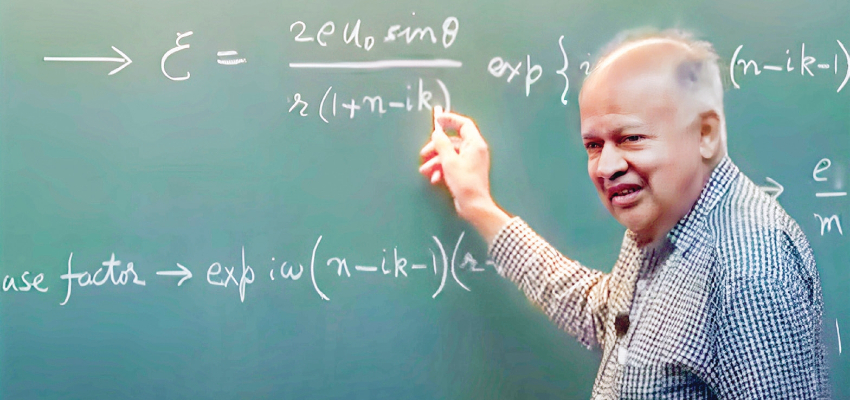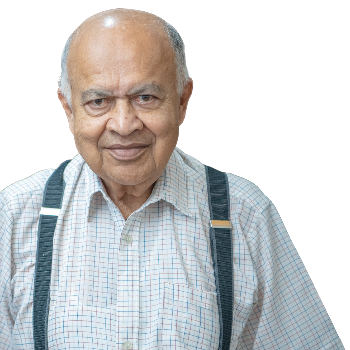ASTROPHYSICIST AMID STARS

One of India's most original scientific thinkers and pioneering astrophysicist-cosmologist, Dr. Jayant Narlikar, passed away recently in Pune. With a mind that sought alternative answers to cosmic mysteries and a vision to take science to the remotest corners of India, in all languages, through the establishment of The Inter University Centre for Astronomy and Astrophysics (IUCAA) in Pune, Narlikar’s work redefined science, education and fearless inquiry. The Jayant Narlikar Memorial Lecture organised by the Pune International Centre (PIC) was not just a tribute to the man, but also a celebration of his life and work
"During an examination the question paper read: Do any six questions, all questions carry equal marks. But, I attempted more than six questions and wrote for the examiner - examine any six questions, all questions carry equal marks."
—Dr. Jayant Narlikar
The above is a simple but profound example of how one of the country’s finest minds worked. Little wonder then that for over 50 years, Dr. Jayant Narlikar built a body of work that consistently questioned prevailing theories about the universe. He was best known for his collaboration with British astronomer Fred Hoyle, with whom he co-developed the Hoyle–Narlikar Theory—a radical alternative to the Big Bang Theory that suggested a universe without a beginning. Though controversial, the theory cemented his reputation as a bold voice in astrophysics.
However, he did not expect his students or co-workers to agree with him; he was generous and expansive enough to tell them to think for themselves.
Determined to show the world that India could have a top-of-the-line scientific centre, he founded the IUCAA in the University of Pune campus, which became a hub for advanced research and education. He spoke out regularly against superstition and pseudoscience, using both reason and charm to advocate for critical thinking.

Extraordinarily so, he also carved a unique space in the world of literature, particularly in the genre of science fiction. You see, he saw fiction not just as a creative outlet, but as a tool to nurture curiosity and scientific thinking, especially among young readers. Writing mainly in Marathi, Narlikar explored speculative ideas through stories that were both imaginative and intellectually grounded.
Works like Preshit and Vaman Parat Na Aala, in Marathi, showcased how advanced concepts like time travel, space exploration, and alien contact could be rendered accessible to general audiences, without diluting scientific integrity.
His storytelling encouraged readers to think critically about the future and our place in the universe. In this way, his work became a bridge connecting scientific knowledge with cultural imagination.
MANAGEMENT LESSONS FROM DR. JAYANT NARLIKAR
- Allowing junior scientists and students the freedom to disagree and pursue their own interests
- Open-door, democratic leadership
- Accessibility and humility
- Great communication skills and ability to inspire by example
A many-splendoured life and legacy
Pointing out that Narlikar had received success early in life, Dr. Raghunath Mashelkar, President of PIC, nevertheless recalled Narlikar’s simplicity and humility, lauding him not just as an individual but an institution in his own right. “I would recommend to the Government of Maharashtra to include a chapter on Narlikar, his life and work, when the next set of textbooks are written,” he said.
Summing up Narlikar’s life and work in 10 points, Mashelkar said: “First of all, he was on a great mission to expand the frontiers of human enquiry and understanding of science, and the universe. Secondly, he wed science with integrity and argued that science is not a matter of opinion but evidence. Thirdly, ensured the outreach of Science through books, programmes and activities across boundaries of language. Fourthly, his unassuming ways stood out. I never saw him put on airs.
Mashelkar further stated that through the foundation of IUCAA, he proved that India could do world class science with world-class Indian minds on Indian soil. He was a great advocate for enquiry and dissent. And, that is evident in the manner in which he democratised the working of IUCCA. He always said that each one is someone; that a marginalised reality does not equate with marginalised ability. There was the lucidity and versatility of his mind, equally at ease with Kalidasa, as with Einstein. In him, we saw how a great scientist could also be a great humanist. He prioritised ethics above all else. He believed that science must aid human well-being and not take away from it. He was rooted in India but reaching for the world.
Last but not the least, he challenged superstitions at every point. “To that end, Narlikar had the courage to stand against the inclusion of astrology in academic curricula, emphasising that pseudoscience had no place in education. What’s more, he fought it with reason and not ridicule.”
On his part, Dr. R. Srianand, current director of IUCAA, emphasised Narlikar's vision in democratising access to astronomy, a prohibitively expensive Science, given the cost of building observatories and sourcing telescopes. He credited Narlikar's establishment of IUCAA's associateship programme for providing nationwide participation in high-level research. It was precisely due to this programme that he, Srianand, a student from Bhubaneswar, came to be staff and finally director at IUCCA.
“IUCAA continues to embody the values Dr. Narlikar instilled,” he said. “What he created wasn’t just a research institute, but a culture of openness, intellectual rigour, and quiet leadership. His presence still echoes through how we work, think, and support one another. Even as our ideas evolve, the foundation he laid remains steady.”
He highlighted Narlikar’s remarkable gift for captivating students. His teaching style he recalled, was measured and deliberate; never rushed, yet incredibly rich in content.
“In his classes, there was a calm rhythm,” Dr. Srianand said. “He spoke at the same steady pace from start to finish, but by the end of the hour, you realised just how much ground he had covered. It was a clear sign of how thoroughly he prepared and how deeply he understood what he was teaching.”
Professor Dr Ajit Kembhavi, former director of the IUCAA, who started out as a PhD student of Narlikar, highlighted Narlikar's preference for the Quasi-Steady State THeory over the Big Bang Theory, which argued that the universe has always existed in a steady state. “He was not for a universe that was born on a Wednesday and finished on a Friday, along with space and time,” he quipped, adding that even though his work gradually diverged from Narlikar’s, he never received any opposition from the latter. “Instead, he told us to do what we liked and believed in. And, this is reflected in the way IUCCA is built and run."
ABOUT IUCAA
- The Inter-University Centre for Astronomy and Astrophysics (IUCAA), founded in 1988 by renowned astrophysicist Dr. Jayant Narlikar, is India’s premier hub for research in astrophysics and cosmology. Located in Pune, IUCAA bridges institutions across the country, enabling university scholars to collaborate on cutting-edge space science. With a focus on both advanced research and inclusive education, it fosters talent through national associateships and public outreach.
QUASI-STEADY STATE THEORY AT A GLANCE
- Dr. Jayant Narlikar’s Quasi-Steady State Model, developed with Fred Hoyle and Geoffrey Burbidge, proposed that the universe has no singular beginning like the Big Bang, but instead undergoes continuous, cyclical expansion with periodic creation of matter. This model aimed to reconcile observations of an expanding universe with a timeless cosmic framework, challenging the mainstream Big Bang cosmology.